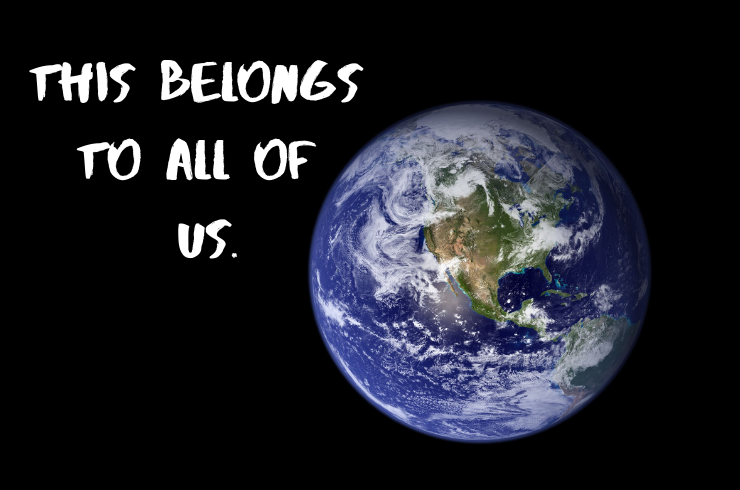Equality is, literally, the state of being equal – people of different genders, races, and abilities on par with one another. Equality means that everybody has the same opportunities, no matter what they look like or where they come from, so people aren’t treated differently because they’re black, or female, or disabled, or overweight. In the United States, equality has not been achieved – not even close.
Equality is a funny thing; it can be hard to see. When it negatively affects you, it’s pretty obvious, but when it affects you positively, not so much. Say two people are hunting for an apartment – one white American, let’s call him John, and one black American, let’s call him Tyrone. Landlords in the US are predominately white. In this case, the white American and the black American have names that give this away. Tyrone will probably get to view fewer apartments than John and, when he applies for one, he will likely be held to a different standard than white applicants. This means that if Tyrone’s application is of the same strength as a white person’s, his will be considered second best.
This is not the case all the time. But it is the case on average. It’s called systemic bias, and it’s built

However, John might not notice this. As far as he’s concerned, he went apartment hunting, saw one he liked and applied for it. He’s not aware of the other people who didn’t get to see that apartment, or who applied for it and didn’t get it. So in his eyes, there was no inequality. Only there was. This can be applied to almost everything in America. That’s why it’s hard for privileged people (who usually experience the benefits of such bias) to be aware that it’s happening, let alone make changes to address it. That’s often why people don’t believe in socialism, or universal healthcare, or higher taxes – because they are benefiting from the current system rather than suffering.
In an unequal society, like the one we’re in, a way to level the playing field is to become less capitalist. That means that rich people will be less rich, yes. But it also means that underprivileged people – women, ethnic minorities, disabled people, LGBTQ people, basically anybody who doesn’t look like a regular white person — will have better opportunities. If everybody has healthcare, then people have the same standard of care, regardless of how much money they have. This seems basic – you shouldn’t be able to buy health – yet in the US you have to. If everybody has access to education, then more people can get the necessary qualifications for high-paying jobs. If only privileged people have access, then only privileged people can get high-paying jobs – and so the cycle continues.
Under-privileged people don’t work crappy jobs because they’re lazy. They work them because that’s what they can get. We are taught to think, “well that’s just life, and life’s not fair”. Correct, it isn’t! But why not? Why do we take that as fact, acceptable? The thought that anybody can work hard and have it all in the old US of A is wrong – and harmful. Let’s say Tyrone was born in the Bronx to a poor family and a sick single mom. And John was born in the Upper West Side to a middle-class family. When Tyrone was beginning high school, he had to get a job to help support his family. This meant that he had less time for school and any other extracurricular pursuits, so he did okay rather than excellently. John, on the other hand, had a regular childhood, did well in school and went to college, which his parents helped pay for. His family wasn’t oozing wealth – they didn’t have a Bentley and a house in the Hamptons – but they had enough to support him. So John had help (from his family) and Tyrone didn’t – but why shouldn’t he get that same level of help from elsewhere (like the government)? What’s inherently wrong with leveling the playing field?

As it is now, there is a stark disparity between different groups of people in America. And, overall, liberals want to change that, while conservatives want to make it worse. It’s pretty simple. One easy, effective change we can make is to raise taxes – and put that money into healthcare, education, and social security. Higher taxes?! That often rings alarm bells. But look at the societies with the highest taxes in the world: Scandinavia. Finland, Norway, Denmark, Iceland were the top four for 2017. Sweden was number nine. Australia, New Zealand, and Canada were in the top ten. What do all these countries have in common? Universal healthcare, access to education, social security systems and, yes, higher taxes.
Scandinavian people are happier; it’s been demonstrated over and over again, while America falls every year as the gap between the 1 and the 99%, and between right and left wing widens. Socialism is almost a swear word here in the US – that needs to change. None of this will happen overnight, and all of it will require a shift of thinking from “this is my experience and that’s how it is” to listening to others and recognizing the barriers that we have erected left, right, and center in this society. As of now, that also means not voting Republican. America isn’t equal; let’s make it so. Are you with me?
